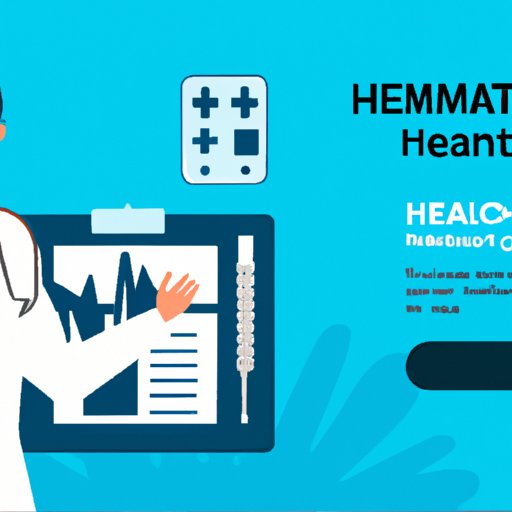
I. Introduction
Health Information Management (HIM) is a vital part of healthcare delivery that ensures proper handling and availability of patient data. In this article, we will explore what HIM entails, its importance, and the career opportunities it presents. This article targets professionals in healthcare, students, and anyone interested in pursuing a career in the field.
II. Definition and Overview
HIM involves the collection, storage, analysis, and dissemination of patient information critical to patient care. Its history dates back to the early 1900s when healthcare facilities started recording patient information. The information collected includes demographic data, medical history, test results, and other relevant data to help healthcare providers make informed decisions about the patient’s care.
Healthcare providers collect data through Electronic Health Records (EHRs), which have replaced paper-based records. EHRs allow the sharing of information among healthcare providers, enabling timely information access and continuity of care. With HIM, healthcare providers have access to accurate and timely data, enabling them to provide high-quality care.
III. Career in Focus
A career in HIM requires a Bachelor’s degree in Health Information Management or a related field. Professionals in this field must have extensive knowledge of medical terminology, coding, and healthcare regulations.
There are diverse opportunities available for accredited HIM professionals, including data analysis, project management, privacy and security compliance, research, and health informatics. According to the Bureau of Labor Statistics, the average salary for HIM professionals is $42,630 annually, with opportunities for growth and advancement.
IV. Technology Focus
Technology is integral to HIM, and its development has revolutionized healthcare delivery. The latest trends include the use of Artificial Intelligence (AI), Machine Learning (ML), and predictive analytics. AI and ML have significantly improved diagnosis accuracy, enabling healthcare providers to deliver more targeted and effective treatment.
Advanced analytics is being used to analyze large amounts of data, providing insightful patient information, leading to better outcomes. Additionally, telemedicine is growing rapidly, enabling healthcare providers to remotely provide care to patients in distant and remote areas. These technologies are empowering healthcare providers with better access to patient data, which is critical to patient care.
V. Importance of Health Information Management
HIM plays a vital role in delivering high-quality care. HIM professionals use data analytics and insights from EHRs to drive evidence-based practice, leading to better care delivery. By ensuring timely, accurate, and comprehensive documentation, HIM professionals provide immediate access to patient’s information, enabling healthcare providers to provide timely interventions.
Additionally, HIM has contributed extensively to population health management by analyzing large data sets to identify trends and inform public policy decisions. HIM has significantly changed how healthcare is delivered and consumed.
VI. Data Confidentiality
The importance of data confidentiality cannot be overstated in HIM. HIM professionals play a critical role in ensuring data privacy and protection. They are responsible for implementing and enforcing policies and regulations that govern data handling and confidentiality.
The Health Insurance Portability and Accountability Act (HIPAA) is a critical regulator that enforces data privacy rules. Additionally, laws such as the General Data Protection Regulation (GDPR) and the California Consumer Privacy Act (CCPA) provide additional protection to patients. HIM professionals must ensure that sensitive data is secured and accessed only by authorized personnel.
VII. Future of Health Information Management
HIM is continually evolving, and the future is promising. Emerging technologies such as Blockchain, AI, and ML will continue to transform healthcare delivery. These technologies will enable the creation of patient-centered care models by delivering more personalized and connected healthcare delivery that ensures patients remain at the center of care.
VIII. Conclusion
This article has provided an overview of health information management. By exploring the career opportunities, data confidentiality, and technological advancements in the field, we can appreciate the importance of HIM in healthcare delivery significantly. We encourage healthcare professionals to consider pursuing a career in HIM, where they can make a significant impact on patient care delivery.




